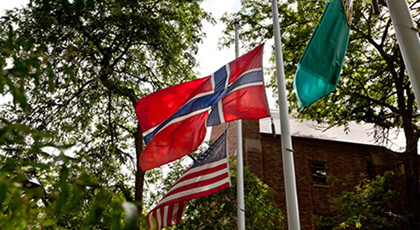Page 431 • (12,691 results in 0.04 seconds)
-
Conference SpeakersDr. Samuel TorvendDr. Marit TrelstadDr. Heather MathewsDr. Lisa MarcusDr. Seth DowlandRabbi Bruce KaddenDr. Samuel TorvendWho: Dr. Samuel Torvend, Professor Emeritus of Religion, PLU and Priest for Adult Formation at Christ Church Episcopal Bio: Samuel Torvend teaches courses in the history of early, medieval, and reformation Christianity as well as historical courses on the reform of social welfare, Christian responses to local and global hunger, Christian art and
-
Institutional Equity and Anti-racism at PLU At the June 17 University Assembly for faculty and staff, Vice President Joanna Royce-Davis shared a set of seven actions the university will take next to “make sustainable change in the experience of our community for our members who experience marginalization.” Words without action are empty, and compromise our mission and our moral and ethical obligation to each other and to our students. Action, along with accountability, truth, healing, and
-
Course Descriptions RELI 131 : The Religions of South Asia - RL, VW, GE Hinduism, Buddhism, Jainism, and Sikhism - their origins and development, expansion, and contemporary issues. (4) RELI 211 : Religion and Literature of the Hebrew Bible - RL, IT This course introduces students to the critical study of the books in the Hebrew Bible Canon. Students will become familiar with the socio-historical context of these biblical books and their major theological themes; explore in depth a
-
Student Life Strategic PlanStudent Life Strategic Priorities 2012-2015 #2 - Enhance Student Achievement and Success1. Advance the education, career, and vocation planning initiatives. Expand the collaborative efforts of the multiple offices and centers involved in the work of assisting students with identifying and attaining their educational goals and developing their vocational and career paths. Goal by May 31, 2020: Increase PLU student utilization of the services available for educational
-
English Department Learning Outcomes - effective January 2019 Literature Major, Minor, and General Education Coursework Reading. Students will interpret texts with attention to ambiguity, complexity, and aesthetic value. Writing Process. Students will practice a deliberate writing process with emphasis on inquiry, audience, research, and revision. Genre and Rhetorical Situation. Students will evaluate genres of writing and write in appropriate genres and modes for a variety of purposes and
-
Give to Wild Hope We are grateful for the alumni, friends, staff, administrators, and faculty whose generosity makes possible the work of the Center for Vocation. Since Wild Hope programming is not financed by the PLU operating budget, we rely on donations to support our Wild Hope Students Fellows, the Staff Seminar in Vocation, Faculty Workshops on mentoring students in vocation, and securing the latest Lutheran, ecumenical and interfaith resources on Vocation. Donate to Wild HopeWe are
-
Political Science Learning ObjectivesRevised 12/18/18 Learning Objectives100 Level200 Level300 Level400 Level Substantive knowledge in the Discipline.Define and describe the basic political processes and institutions of government including definitions of politics.Apply the central concepts to the role of various actors including citizens, interest groups, political parties, and politicians within political systems.Apply the central theories and concepts in independent research.Convey
-

July 27, 2011 ‘We are all Norwegians’ By Loren J. Anderson Ladies and Gentlemen: We gather this evening to remember and pay tribute, to share our hurt and show that we care, and to grieve for those we have lost, even as we reach out to support one another. The Norwegian flag stands at half staff – along with the U.S. flag and Washington state flag – on the PLU campus in remembrance of the victims of the attacks in Norway. (Photo by John Froschauer) We are drawn together by the quite natural
-
PLU’s General Education Program prepares graduates to ask significant questions, engage relevant knowledge, and wrestle with complex issues. The program is rooted in the classical liberal arts and sciences as understood within the Lutheran educational tradition, and is grounded in an understanding of scientific perspectives, mathematics, languages, and the long-standing traditions of critical discourse about nature, humanity and the world. The array of academic disciplines has developed as a
-
Student Life Strategic PlanStudent Life DivisionCommitments to Excellence1. We are committed to educating students in a collaborative co-curricular learning community that engages students through personal connections and nurtures them to develop their full potential. Collaboration: We know that student success is the result of the work of many people. We are committed to collaboration with: students, faculty and staff colleagues; parents and family members; employers; and others who are a part
Do you have any feedback for us? If so, feel free to use our Feedback Form.


